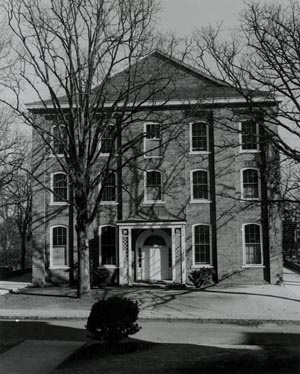Completed: 1892
Architect: S. L. Leary
 |  |
John Franklin Crowell (1857-1931) became President of Trinity College at the age of 29, serving from 1887 to 1894. Crowell was instrumental in moving Trinity College to Durham and gaining the support of the Duke family. Crowell gradually upgraded the faculty and improved the educational facilities of the college. He was responsible for modernizing Trinity's curriculum, turning it away from recitation and towards research. Crowell was also interested in athletics and introduced football to Trinity.
Crowell Hall was initially named the Technological Building. The funding for the building was given by President Crowell in memory of his wife, who died around the time of the relocation of the college from Randolph County to Durham. The name of the building was changed by the Board of Trustees in 1896 in recognition of his gift.
Originally home to Trinity College's biology, chemistry, and physics labs and classrooms; a small natural history museum; and an electrical generator in the basement that provided electricity for the entire campus, the building was state of the art for its time. As time passed, Crowell Hall also featured a blueprint room, machine shop, and carpentry shop. By 1901 however, the electricity generating facilities were in need of renovation, and a $25,000 addition was made, funded by the Duke family, to expand its capacity. Ten years later however, Trinity discontinued use of the electrical generators, and by 1926 the building was used for little more than storage space.
When East Campus became the Woman's College, work began on converting the second and third floors into sorority living spaces, which opened in 1935. In 1947, the Board of Trustees authorized another renovation, and the first floor was converted into a student center featuring a post office, the East Campus Dope Shop, and a recreation room. The constant use of the building took its toll and in 1960, the second and third floors were condemned and only used for storage. On May 6th, 1974, an electrical short caused a fire and did extensive damage to the second floor. In 1982, the second and third floors of Crowell Hall were renovated for use as headquarters of Duke University Press. Crowell now houses departments within the Office of Student Affairs and the Duke Coffee House.
For Further Research:
- Biographical Reference Collection: Contains biographical information on Crowell
- Building Reference Collection: Contains historical building information
- Flickr photographs of the Crowell Building
- John Franklin Crowell Records and Papers, 1883-1932 and undated

